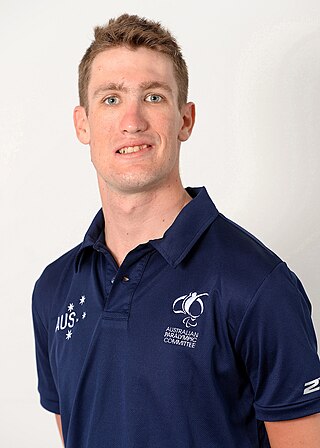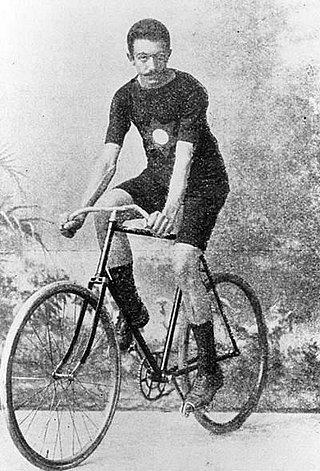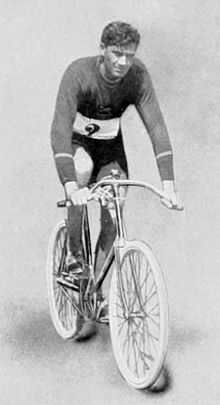
Track cycling is a bicycle racing sport usually held on specially built banked tracks or velodromes using purpose-designed track bicycles.
Cycle sport is competitive physical activity using bicycles. There are several categories of bicycle racing including road bicycle racing, cyclo-cross, mountain bike racing, track cycling, BMX, and cycle speedway. Non-racing cycling sports include artistic cycling, cycle polo, freestyle BMX, mountain bike trials, hardcourt bike polo and cycleball. The Union Cycliste Internationale (UCI) is the world governing body for cycling and international competitive cycling events. The International Human Powered Vehicle Association is the governing body for human-powered vehicles that imposes far fewer restrictions on their design than does the UCI. The UltraMarathon Cycling Association is the governing body for many ultra-distance cycling races.

Cycling competitions at the 1980 Summer Olympics were split into two categories: Road and Track. Six events were contested. All four events of the track cycling were held at the Velodrome of the Trade Unions Olympic Sports Centre. The 100 km team time trial event was held along the Moscow-Minsk highway. It started from 23rd kilometre off Moscow, had a turning point at 73.5 kilometre off Moscow and finished not far from the starting point. The individual road race event was held at the Olympic Cycling Circuit of the Trade Unions Olympic Centre.

The men's individual road race was a cycling event at the 2004 Summer Olympics. It was held on 14 August 2004. There were 144 competitors from 43 nations. The maximum number of cyclists per nation had been set at five since professionals were allowed in 1996. The event was won by Paolo Bettini of Italy, the nation's first victory in the men's individual road race since 1992 and fifth overall. Sérgio Paulinho's silver was Portugal's first medal in the event. Belgium earned its first medal in the men's road race since 1964 with Axel Merckx's bronze.

Road bicycle racing is the cycle sport discipline of road cycling, held primarily on paved roads. Road racing is the most popular professional form of bicycle racing, in terms of numbers of competitors, events and spectators. The two most common competition formats are mass start events, where riders start simultaneously and race to a set finish point; and time trials, where individual riders or teams race a course alone against the clock. Stage races or "tours" take multiple days, and consist of several mass-start or time-trial stages ridden consecutively.

At the 1912 Summer Olympics in Stockholm, one cycling event was contested on Sunday, 7 July. This event was a time trial which also counted as an individual race. For the only time in Olympic history, no track cycling events were held.

Austria competed at the 1912 Summer Olympics in Stockholm, Sweden. Austrian and Hungarian results at early Olympic Games are generally kept separate despite the union of the two nations as Austria-Hungary at the time. 85 competitors, 76 men and 6 women, took part in 46 events in 12 sports.

The men's individual road race at the 1952 Summer Olympics was held on 2 August, the 2nd last day of the Olympics on an 11,2 km course running counter-clockwise from Käpylä through Pakila and Maunula and back to Käpylä. The course was circled seventeen times, so the total length of the competition was 190,4 km. About half of the road was hard-surfaced, the other half sand-surfaced. There were 154 entries from 31 nations and 111 participants from 30 nations. Each nation could enter up to four cyclists; nations entering at least three cyclists had the scores of their best three finishers summed for the team road race event. The individual event was won by André Noyelle of Belgium, the nation's first victory in the men's individual road race. His teammate Robert Grondelaers took silver. Edi Ziegler earned Germany's first medal in the event since 1896 with his bronze.

The men's individual road race at the 2000 Summer Olympics in Sydney, Australia, was held on Wednesday, 27 September 2000 with a race distance of 239.4 km. The estimated global TV audience was 600 million. They were specifically held in Sydney's Eastern Suburbs. There were 154 cyclists from 41 nations competing. The maximum number of cyclists per nation had been five since professionals were allowed in 1996. The event was won by Jan Ullrich of Germany, the nation's first victory in the men's individual road race. His teammate Andreas Klöden's bronze made this race the first time one nation had taken two medals in the event since 1988—when West Germany had done so by taking silver and bronze. Alexander Vinokourov took silver for Kazakhstan's first medal in the event.

The men's individual road race at the 1996 Summer Olympics in Atlanta, was held on July 31, 1996. There were 183 participants from 57 nations in the race over 221.85 km, with 116 cyclists finishing. For the first time, the event was open to professionals. Previously, it was restricted to "amateurs" which included state-funded Eastern Bloc athletes. The maximum number of cyclists per nation was five, up from three in previous editions of the event. The event was won by Pascal Richard of Switzerland, the nation's first victory in the men's individual road race and first medal in the event since a bronze in 1936. Rolf Sørensen earned Denmark's third medal in the event, silver just as in 1964 and 1968. Max Sciandri similarly matched Great Britain's best result: a bronze, as in 1896 and 1956.
An omnium is a multiple race event in track cycling. Historically the omnium has had a variety of formats. In recent years, road racing has also adopted the term to describe multi-day races that feature the three primary road race events.

Cycling at the 2008 Summer Paralympics consisted of 44 events in two main disciplines, track cycling and road cycling. Track cycling was held in Laoshan Velodrome on 7–10 September, and road cycling took place at the Changping Triathlon Venue on 12–14 September.

The men's individual road race at the 1948 Summer Olympics was held on an 11.45 km course. The course was circled seventeen times, so the total length of the competition was 194.6 km. There were 141 entries from 31 nations and 101 participants from 29 nations. Of the 101 starters, 28 rode the distance to the end. The event was won by José Beyaert of France, the nation's second consecutive victory in the men's individual road race. The Netherlands and Belgium won their first medals in the event, with Gerrit Voorting's silver and Lode Wouters's bronze, respectively.

David Nicholas, is an Australian cyclist. He won silver and gold medals at the 2012 London Paralympics and a gold medal at the 2016 Rio Paralympics and a bronze medal at the 2020 Tokyo Paralympics.

The men's road race was one of 18 cycling events of the 2016 Olympic Games in Rio de Janeiro. The race started and finished on 6 August at Fort Copacabana and was won by Greg Van Avermaet of Belgium. It was Belgium's first victory in the men's individual road race since 1952 and second overall, tying France and the Soviet Union for second-most behind Italy (five). Belgium matched Italy for most total medals, at seven. Jakob Fuglsang won Denmark's fourth silver medal in the event; the nation had yet to win gold. Rafał Majka's bronze was Poland's first medal in the event since 1980.

The men's individual road race cycling event at the 1936 Summer Olympics took place on 10 August over 100 km. Ninety-nine cyclists from 28 nations competed. This was the first time that the cycling road race was conducted as a mass start event since 1896 and was one of six cycling events at the 1936 Olympics. The men's team road race was held in conjunction with this event, with teams having four riders and the team time taken as sum of the team's three best finishers. The individual event was won by Robert Charpentier of France, with his teammate Guy Lapébie in second. Ernst Nievergelt of Switzerland took bronze. They were the first men's mass-start road race medals for both nations, which had not competed in 1896.

The men's individual road race at the 1960 Summer Olympics in Rome, Italy, was held on 30 August 1960. There were 142 participants from 42 nations. Each nation could enter up to four cyclists. Of the 142 starters 76 rode the distance to the end. The event was won by Viktor Kapitonov of the Soviet Union, the nation's first medal in the event. Livio Trapè of Italy took silver, putting that country on the podium for the second consecutive Games. Willy Vanden Berghen's bronze gave Belgium its fourth medal in four Games.

The 2016 UCI Track Cycling World Championships were the World Championships for track cycling in 2016. They took place in London in the Lee Valley VeloPark from 2–6 March 2016.

The men's sprint event at the 2020 Summer Olympics took place from 4 to 6 August 2021 at the Izu Velodrome. 30 cyclists from 18 nations competed.

The road race is one of two road bicycle racing events held at the Summer Olympics, the other being the time trial. The road race is a mass start, distinguished from the separate starts of the time trial. The men's road race was first held at the 1896, was not held again for 40 years, then has been held every Summer Games since the 1936 Summer Olympics. The women's event was first contested at the 1984 Summer Olympics, being the first women's cycling event.


















